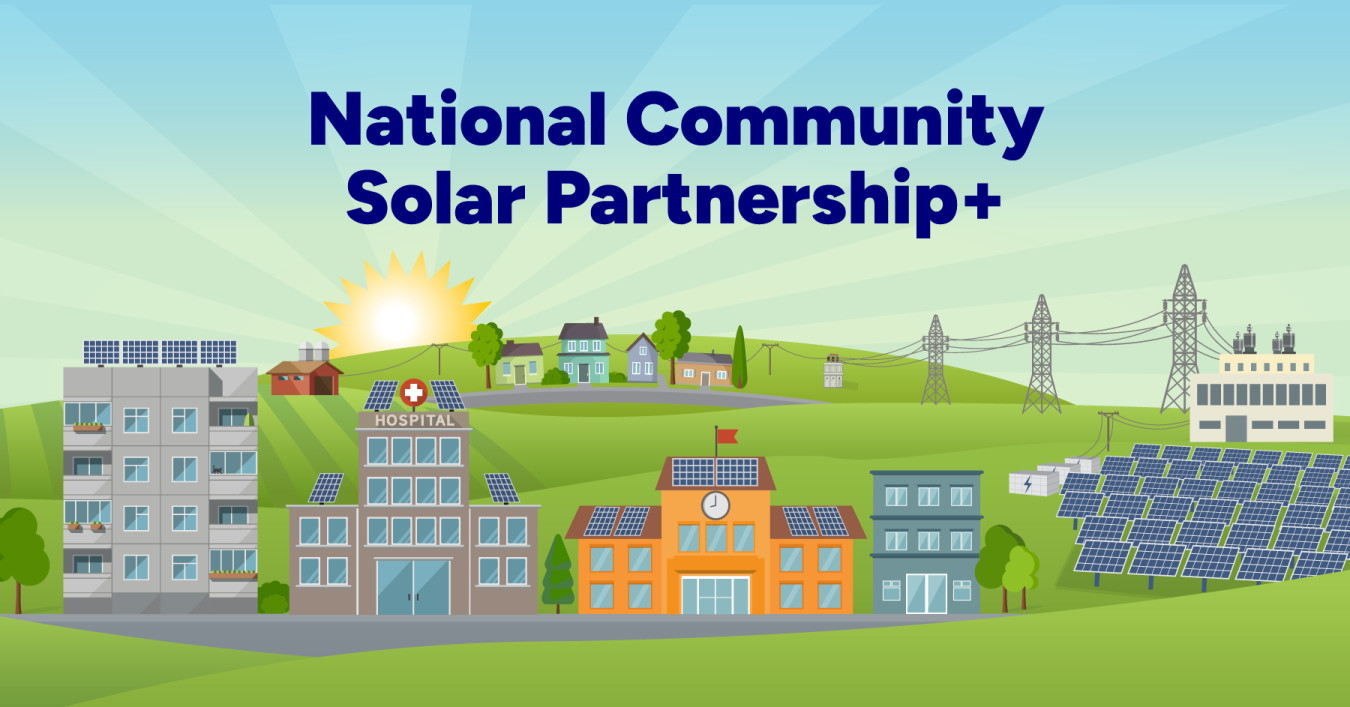The National Community Solar Partnership+ (NCSP+) is a coalition of stakeholders working to expand access to affordable distributed solar to every U.S. household, while also enabling communities to realize the meaningful benefits of solar energy, which include access, household savings, energy reliability and resilience, community-led economic development, and solar workforce opportunities. Learn more about NCSP+ and join an event or workshop.
NCSP+ News
-
The NRECA ACCESS project researched how to make solar energy affordable for low-and moderate-income (LMI) communities. Through this project, a toolkit was developed to assist electric co-ops and the broader industry deploy equitable solar projects.July 11, 2024
-
Fellowship funds energy professionals to help regional organizations make community solar more accessible.February 6, 2023
-
The U.S. Department of Energy (DOE) Solar Energy Technologies Office announced 31 teams as finalists for The Sunny Awards for Equitable Community Solar.November 9, 2022
-
A new partnership between the DOE National Community Solar Partnership and the U.S. Department of Health and Human Services will develop and pilot a digital platform to enable more low-income households to access community solar.April 21, 2022
-
Energy Secretary Jennifer M. Granholm visited Gar Creek Solar, a new community solar site in Kankakee County, Illinois. The National Community Solar Partnership announced that their 2022 Annual Summit will take place on January 25.December 16, 2021
-
New efforts include $15.5 million to tackle barriers to solar deployment, increased focus on expanding clean energy access to low- and moderate-income communities and fostering a diverse solar workforce,May 4, 2021
-
“Solar in Your Community Challenge” Brings Solar—and Savings—to More AmericansFebruary 20, 2020
NCSP+ Initiatives
-
The U.S. Department of Energy and the U.S. Department of Health and Human Services are collaborating to pilot a digital tool that will enable more low-income households to access the benefits of community solar.
-
 To support rapid deployment of affordable and accessible community solar, NCSP offers technical assistance that provides the resources needed to swiftly and successfully implement affordable, sustainable community solar programs.February 6, 2025
To support rapid deployment of affordable and accessible community solar, NCSP offers technical assistance that provides the resources needed to swiftly and successfully implement affordable, sustainable community solar programs.February 6, 2025
NCSP+ Quick Links

NCSP+ is an active group of community members, developers, utilities, financial institutions, and governments dedicated to increasing access to distributed solar for all U.S. households. Partners receive access to technical assistance, resources, training, events, and a platform for connecting with other collaborative partners. Register to join the partnership today!
NCSP+ hosts webinars and other events designed to serve as resources for partners, collaborators, and other stakeholders. In addition to the events for the public, NCSP+ also holds members-only events. View all upcoming NCSP+ events.
NCSP+ tracks progress toward the goal of expanding access to affordable community solar to every household in the United States. One of the ways this is accomplished is by gathering and analyzing community solar project data in three categories:
- Access to community solar projects by state, looking at where they are installed and how much capacity exists;
- Affordability of community solar subscriptions for residential subscribers; and
- Progress states are making on including low-income access in their community solar programs.
What is Community Solar?
The U.S. Department of Energy defines community solar as any solar project or purchasing program, within a geographic area, in which the benefits of a solar project flow to multiple customers such as individuals, businesses, nonprofits, and other groups. Community solar is a form of solar energy generation that allows community members of all types to access meaningful benefits of renewable energy, such as reducing household energy costs.
Community solar programs make solar more accessible to all U.S. households, particularly to those with low-to-moderate incomes, renters, and other community members for whom traditional rooftop solar is unavailable. Rather than putting solar on their own home or building, community solar allows energy users to subscribe to a shared system of solar panels, often located within their community.
NCSP Expands to Include Additional Solar Technologies
While community solar is one method of expanding access to solar energy, it is not the only way. In 2024, NCSP expanded to NCSP+, to include resources for low- and moderate-income residential rooftop solar + storage, commercial solar projects, microgrids, and distributed solar + storage aggregations such as virtual power plants, serving low-income communities. This expansion enables more organizations and stakeholders to take part in NCSP+.
Blog Posts
-
The members of People Power Solar Cooperative in Oakland, California, are demonstrating the feasibility and benefits of community-owned solar, a type of community solar in which residents of a community collectively own a solar system.June 21, 2022
-
The team that pioneered community solar at the New York City Housing Authority’s (NYCHA) Queensbridge Houses worked together to overcome challenges and ensure access to the benefits of community solar.November 30, 2021
-
If you want to power your home with clean energy and lower your electricity bills, but live in an apartment or multifamily home, don’t own your roof, or your roof isn’t suitable for a solar energy system, you can subscribe to a community solar project.October 13, 2021
-
Community-owned solar is growing in Hope Village, a 107-block neighborhood in Detroit, thanks to the work of HOPE Village Revitalization, the neighborhood’s community development corporation.October 1, 2021

